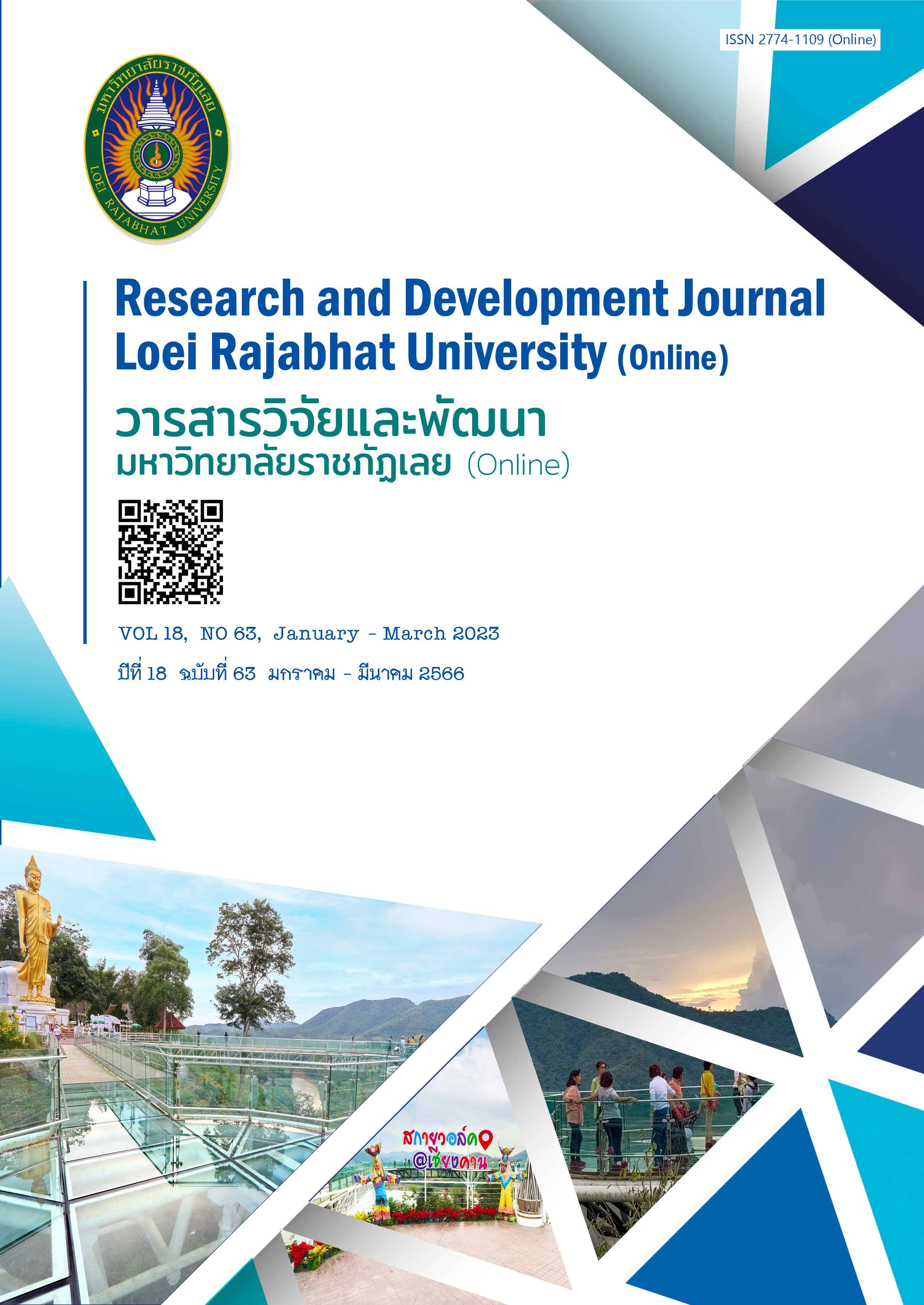แนวทางการพัฒนาทุนมนุษย์ในธุรกิจโรงแรมเครือข่ายนานาชาติหลังสถานการณ์การแพร่ระบาดของเชื้อไวรัสโควิด-19
คำสำคัญ:
ทุนมุนษย์, โรงแรมเครือข่ายนานาชาติ, โควิด-19บทคัดย่อ
การวิจัยนี้มีวัตถุประสงค์เพื่อ 1) ศึกษาข้อจำกัดและอุปสรรคต่อการพัฒนาทุนมนุษย์ในธุรกิจโรงแรมเครือข่ายนานาชาติ 2) การวิเคราะห์กลยุทธ์การพัฒนาทุนมนุษย์ในธุรกิจโรงแรมเครือข่ายนานาชาติ และ 3) ศึกษาระดับความคิดเห็นเกี่ยวกับการพัฒนาทุนมนุษย์ในธุรกิจโรงแรมเครือข่ายนานาชาติ หลังสถานการณ์การแพร่ระบาดของเชื้อไวรัสโควิด-19 เป็นงานวิจัยแบบผสมผสาน มีการสัมภาษณ์เชิงลึก ตัวแทนจากกลุ่มบุคลากรที่มีส่วนในการตัดสินใจเกี่ยวกับขั้นตอนการดำเนินงานพัฒนาทุนมนุษย์ในโรงแรมเครือข่ายนานาชาติ จำนวน 9 คน ร่วมกับการเก็บรวบรวมข้อมูลจากแบบสอบถามกับกลุ่มผู้ปฏิบัติงานโรงแรมเครือข่ายนานาชาติ จำนวน 100 คน และคณาจารย์หลักสูตรการจัดการโรงแรม หรือหลักสูตรที่เกี่ยวข้องกับอุตสาหกรรมการบริการและการท่องเที่ยวในมหาวิทยาลัยกำกับของรัฐและเอกชน จำนวน 15 คน ผลการศึกษาพบว่า 1) ข้อจำกัดและอุปสรรคต่อการพัฒนาทรัพยากรมนุษย์ ได้แก่ การไม่สามารถจัดการฝึกอบรมแบบเผชิญหน้าได้ตามปกติ การสูญเสียพนักงานจำนวนมาก การถ่ายทอดความรู้เกี่ยวกับทักษะอาชีพไม่ชัดเจน และต้นทุนการดำเนินงานที่ถูกปรับเปลี่ยนไปตามสถานการณ์ 2) การพัฒนาทุนมนุษย์ทั้ง 3 ด้าน ได้แก่ ด้านทุนทางสังคม ด้านทุนทางอารมณ์ และด้านทุนทางปัญญา รวมทั้งการให้ความสำคัญกับการยกระดับความเป็นมืออาชีพและการเสริมทักษะใหม่ให้เหมาะสมกับงานที่เปลี่ยนไป และ 3) ความคิดเห็นเกี่ยวกับการพัฒนาทุนทุนมนุษย์ ทั้ง 3 ด้าน มีค่าเฉลี่ยรวมอยู่ในระดับมากที่สุด
เอกสารอ้างอิง
กันย์สินี ศิลปวาณิชย์. (2563). Industry Insight ธุรกิจโรงแรม. TMB Analytics, 1(2020), 1-3.
เจนรพ เบี้ยฟู. (2561). ความฉลาดทางอารมณ์ ความสนิทสนมกับเพื่อนร่วมงาน แรงบันดาลใจ การสื่อสาร และความก้าวหน้าในอาชีพที่ส่งผลต่อความสำเร็จในการทำงานของพนักงานบริษัทเอกชนในเขตสีลม กรุงเทพมหานคร (การค้นคว้าอิสระปริญญามหาบัณฑิต). มหาวิทยาลัยกรุงเทพ, ปทุมธานี.
ฐานเศรษฐกิจดิจิทัล. (2565, เมษายน). วิบากกรรม "ธุรกิจโรงแรมไทย"ต้นทุนพุ่งซํ้าเติมโควิด-19. สืบค้นจาก https://www.thansettakij.com/business/521638?as&fbclid=IwAR2W1N1VCMJEuJKg0ldUAdYNck6EAdt-PlskUXBWnoxWXkHjleC1XGA6-yM.
ธิติมา บุญธรรม. (2559). แนวทางการพัฒนาการดำเนินการด้านทุนมนุษย์เพื่อพัฒนาคุณภาพการบริการของโรงแรมในเขตเทศบาลนครสุราษฏร์ธานี. (วิทยานิพนธ์ปริญญามหาบัณฑิต). มหาวิทยาลัยสงขลานครินทร์, สงขลา.
นิศาชล จันทรานภาสวัสดิ์, วรวรรธน์ วรกุลพัชรวัฒน์ และ วิพล โชติวรรณชูสกุล. (2562). การบริหารทรัพยากรมนุษย์เพื่อส่งเสริมการท่องเที่ยวของประเทศไทย. วารสารวิทยาลัยดุสิตธานี, 13(2), 439-453.
ผ่องพรรณ ตรัยมงคลกูล และ สุภาพ ฉัตราภรณ์. (2549). การออกแบบการวิจัย. กรุงเทพฯ: มหาวิทยาลัยเกษตรศาสตร์.
พุทธชาด ลุนคำ. (2562). แนวโน้มธุรกิจ/อุตสาหกรรม ปี 2562-64 ธุรกิจโรงแรมย่านกลางเมืองกรุงเทพฯ. Krungsri Research, (2562), 1-8.
แพมาลา วัฒนเสถียรสินธุ์. (2559). ปัจจัยที่ส่งผลต่อปัญหาการสื่อสารในองค์กร กรณีศึกษา บริษัท ยูไนเต็ด แสตนดาร์ด เทอร์มินัล จำกัด (มหาชน). (การค้นคว้าอิสระปริญญามหาบัณฑิต). มหาวิทยาลัยธรรมศาสตร์, กรุงเทพฯ.
ภิญญดา ปีติวรรณ และ ระชานนท์ ทวีผล. (2564). ทิศทางการพัฒนาทุนมนุษย์ในธุรกิจโรงแรมเครือข่ายนานาชาติในประเทศไทยหลังสถานการณ์การแพร่ระบาดของเชื้อไวรัสโควิด-19. รายงานสืบเนื่องการประชุมวิชาการระดับชาติ ครั้งที่ 9 ประจำปี 2564 (น. 437-452). การประชุมวิชาการระดับชาติ ครั้งที่ 9 ประจำปี 2564 คณะวิทยาการจัดการ มหาวิทยาลัยศิลปากร, เพชรบุรี.
โยษิตา หลวงสุรินทร์ และ ธัศฐ์ชาพัฒน์ ยุกตานนท์. (2564). การบริหารจัดการการเรียนออนไลน์ กรณีศึกษา: มหาวิทยาลัยราชภัฎอุดรธานี. วารสารร่มพฤกษ์, 39(1), 125-140.
สำนักงานคณะกรรมการส่งเสริมการลงทุน. (2565, มีนาคม). ข้อมูลทั่วไปด้านประชากร. สืบค้นจาก https://www.boi.go.th/index.php?page=demographic&language=th.
สิริทิพย์ ฉลอง. (2563). ธุรกิจโรงแรม. วารสาร GSB Research, (2563), 1-6.
อารีย์วรรณ อ่วมตานี. (2559). การวิจัยเชิงคุณภาพทางการพยาบาล (Qualitative research in nursing). กรุงเทพฯ: โรงพิมพ์แห่งจุฬาลงกรณ์มหาวิทยาลัย.
อนิรุทธิ์ ผ่องแผ้ว, ชนินทร์ วิชุลลตา, สุขจิตต์ ณ นคร และ ศรัญญา ประทุนเพ็ชร. (2563). ปัจจัยที่มีผลต่อการตัดสินใจเข้าใช้บริการโรงแรมห้าดาวในกรุงเทพมหานคร. วารสารรัชต์ภาคย์, 14(36), 163-172.
Brien, A., Anthonisz, A. and Suhartanto, D. (2019). Human capital in the Dubai hotel industry: A study of four- and five-star hotels and the HR challenges they face. Journal of Human Resources in Hospitality & Tourism, 18(2), 240-258.
Cronbach, L. J. (1990). Essentials of Psychological Testing. London: Harper Collins.
De Souza Meira, J. V. and Hancer, M. (2020). Using the social exchange theory to explore the employee-organization relationship in the hospitality industry. International journal of Contemporary Hospitality Management, 33(2), 670-692.
Kulilung, T., Pratoom, K., and Jhun – indra, P. (2018). Factors affecting human capital management capability: An empirical investigation from hotel businesses in Thailand. Journal of MCU Social Science Review, 7(1), 196-211.
Lan, J., Wong, I. A. and Guo, J. W. (2021). Service training intervention and time-variant personal growth. International Journal of Hospitality Management, 98, 1-10.
Mahadiputra, I. G. E. S. and Piartrini, P. S. (2021). The Moderating Role of Emotional Intelligent On the Relationship among Job Stress, Organizational Justice and Counterproductive Behavior. American Journal of Humanities and Social Sciences Research, 5(1), 672–683.
Rovinelli, R. J. and Hambleton, R. K. (1977). On the use of content specialists in the assessment of criterion – references test item validity. Dutch Journal of Educational Research, 2, 49-60.
Wu, X., Wang, J. and Ling, Q. (2021). Managing internal service quality in hotels: Determinants and implications. Tourism Management, 86, 1-13.
Yamane, T. (1973). Statistics: An Introductory Analysis. New York: Harper & Row, Publishers, Inc.
ดาวน์โหลด
เผยแพร่แล้ว
รูปแบบการอ้างอิง
ฉบับ
ประเภทบทความ
สัญญาอนุญาต
ลิขสิทธิ์ (c) 2023 วารสารวิจัยและพัฒนา มหาวิทยาลัยราชภัฏเลย

อนุญาตภายใต้เงื่อนไข Creative Commons Attribution-NonCommercial-NoDerivatives 4.0 International License.
ข้อความที่ปรากฎในวารสารฉบับนี้เป็นความคิดเห็นของผู้เขียนแต่ละท่าน สถาบันวิจัยและพัฒนา มหาวิทยาลัยราชภัฏเลย และกองบรรณาธิการ ไม่จำเป็นต้องเห็นด้วยและไม่มีส่วนรับผิดชอบใดๆ
สถาบันวิจัยและพัฒนา มหาวิทยาลัยราชภัฏเลย ขอให้ผู้อ่านอ้างอิงในกรณีที่ท่านคัดลอกเนื้อหาบทความในวารสารฉบับนี้






